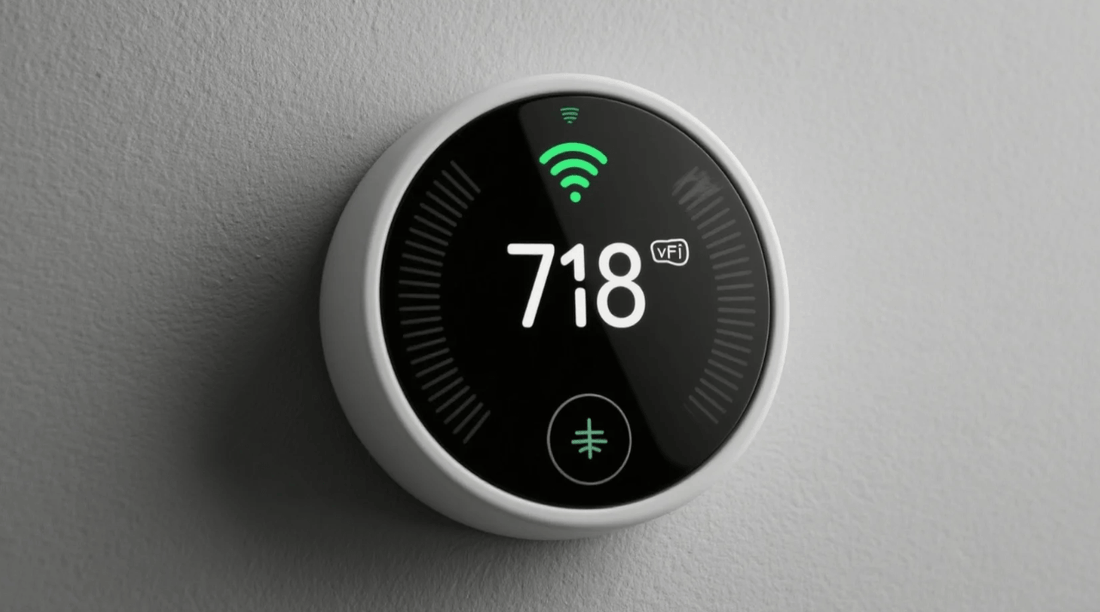
WiFi Thermostat Guide: Smarter Comfort & EdgeAnt Value
Share
A WiFi thermostat gives your HVAC system a brain that talks to the cloud. By learning schedules, reacting to voice commands, and logging every degree it delivers year-round comfort while trimming 8 – 20 % off heating-and-cooling costs. Industry forecasts show global thermostat revenue tripling by 2034, and carbon-impact studies rank connected thermostats among the top home upgrades for climate action. EdgeAnt rides this wave with sub-US $100 WiFi units that combine seven-day programming, app control, and a free C-wire adapter—so smart savings arrive sooner.
What a WiFi thermostat is―and isn’t
A WiFi thermostat replaces the old dial with:

A control head that senses temperature and humidity and houses a Wi-Fi radio.
A relay baseplate that switches 24-V signals to the furnace, heat pump, or boiler.
Cloud software that stores schedules and pushes firmware updates.
Unlike basic programmable models, WiFi versions send live data to phones and voice services such as Alexa or Google Assistant, letting owners adjust settings from anywhere. Department of Energy data confirm that even simple 7–10 °F set-backs can save up to 10 % a year, and studies show learning or geofenced algorithms raise that figure into the mid-teens.
How it works under the hood
The micro-controller compares real-time readings with your stored schedule. When the clock hits a set-back, a low-voltage relay opens or closes the R-W or R-Y circuits, commandeering the HVAC without human help. Over-the-air updates add new logic—Matter support is being rolled out across many brands during 2025.
Tangible benefits of installing a WiFi thermostat
Energy & money
DOE research pegs annual savings near 10 % with manual scheduling; field trials on connected models see 8-20 % cuts.
Peak-demand programs pay users to pre-cool or pre-heat; surveys in Québec show rising enrollment as automation grows.
Comfort & convenience
Voice commands eliminate hallway trips, while mobile apps tweak set-points before you arrive home. Remote alerts warn of furnace faults or frozen-pipe risks.

Sustainability
Project Drawdown estimates that smart thermostats could avoid up to 7.25 gigatons of CO₂ by 2050 if adoption reaches 55 % of online households.
EdgeAnt’s approach to WiFi thermostat value
EdgeAnt’s EHVC-series targets homeowners who want connected control without premium pricing:
| Model | HVAC support | Key feature | Street price |
|---|---|---|---|
| EHVC 513 | Conventional & heat-pump (C-wire adapter included) | 7-day / 4-period schedule | US $75 |
| EHVC 523 | Adds humidity display & finer temp steps | Alexa & Google voice | US $95 |
| EHVC kit + adapter | Same hardware plus power-extender | Easiest two-wire install | US $115 |
Product pages highlight app + voice control, filter reminders, and child-lock security. By undercutting many US$150-plus rivals, EdgeAnt closes the payback gap to roughly 12 months for median U.S. loads.
Stand-out specs
Full-featured Smart Life app—share control with family, log energy trends, and receive firmware updates.
Hands-free commands via Alexa or Google Assistant out of the box.
C-wire adapter bundled, sparing rewiring hassles.
Installing & integrating
Compatibility check
Most 24-V furnaces and heat pumps are supported; EdgeAnt lists wiring diagrams and a compatibility quiz online.
Five-step DIY outline
Cut power at the HVAC breaker.
Label wires on the old stat; photograph for backup.
Mount baseplate; connect R, C (or adapter), W, Y, G leads.
Restore power; pair on 2.4 GHz Wi-Fi with the in-app wizard.
Import or build schedules, then link Alexa or Google.
Consumer-facing guides note that most DIYers finish in under an hour if the adapter is used.
Security & data ethics
Only 13 % of buyers read a thermostat’s privacy policy, yet HVAC data can reveal occupancy patterns. EdgeAnt encrypts traffic, lets users disable cloud analytics, and stores logs locally during outages.
Market momentum & future features
Analysts forecast the global thermostat market growing from US $7.3 billion in 2025 to US $21.8 billion by 2034, a 12.9 % CAGR. Upcoming firmware waves will add Matter certification for cross-platform control, predictive maintenance that flags faltering compressors ahead of failure, and dynamic-pricing APIs that shift HVAC load to cheap renewable hours.
ROI snapshot
| Metric | Typical value |
|---|---|
| Up-front (EdgeAnt) | US $75 – 115 |
| Annual HVAC savings | US $50 – 180 |
| Payback period | 9 – 18 months |
| CO₂ avoided (avg US grid) | 0.25–0.45 t/yr |